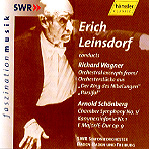Erich Leinsdorf’s Wagner arrangements take us through the whole of the Ring cycle in just 48 minutes (well, almost, as he leaves out Rheingold). By drawing principally on Wagner’s orchestral interludes as well as including his own selection of key vocal scenes (without the voices), Leinsdorf has come up with a satisfying compendium that follows the cycle’s dramatic narrative. The selections flow from one to the next without interruption. Thus, we begin with the Ride of the Valkyries, which is immediately followed by the Magic Fire Music. Next we encounter Siegfried passing through said fire, though curiously before he ascends the Valkyrie rock. Dawn breaks, and we’re off on Siegfried’s Rhine Journey, which leaves us at Hagen’s lair where the low brass announce his dire intentions. The evil deed done, we now arrive at Siegfried’s funeral, which sets the stage for Brunnhilde’s immolation scene.
At 41 minutes Leinsdorf’s Parsifal arrangement is only slightly shorter than his entire set of Ring excerpts, and it includes large swaths of continuous music as it appears in the opera. The arrangement centers only on the first and last acts (which comprise all the real action of the story anyway), and offers the Act 1 Prelude, Transformation music, and Final Scene, and Act 3’s Prelude and Good Friday Music, Titurel’s Funeral, and Finale. Leinsdorf conducts both arrangements with heightened sensitivity to the music’s flow and pulse, accompanied by a strong sense of the overall drama, making for an exceptionally vivid storytelling experience. The SWR Symphony sounds fully immersed in the Wagnerian idiom, and plays with much beauty if not the penetrating power of the Vienna Philharmonic under Solti, or the luxurious heft of the Metropolitan Opera Orchestra under Levine. The recording’s slight opacity and dynamic limitation diminishes some of the performance’s impact.
Although at first it seems a curious discmate, Schoenberg’s Chamber Symphony No. 1 owes much of its harmonic style to the fourth intervals Schoenberg “learned” from the second act of Tristan und Isolde (of course, its not the kind of thing about which you can say “oh yeah, there they are!”). Leinsdorf again shapes the music purposefully, leading his players (the woodwinds especially) in a vivid recreation of the score; but I miss the piercing clarity of the Los Angeles Philharmonic under Mehta and the rollicking energy of Orpheus Chamber Orchestra, both of which provide stunning performances of this work. The sound in this case has greater clarity and presence.
































